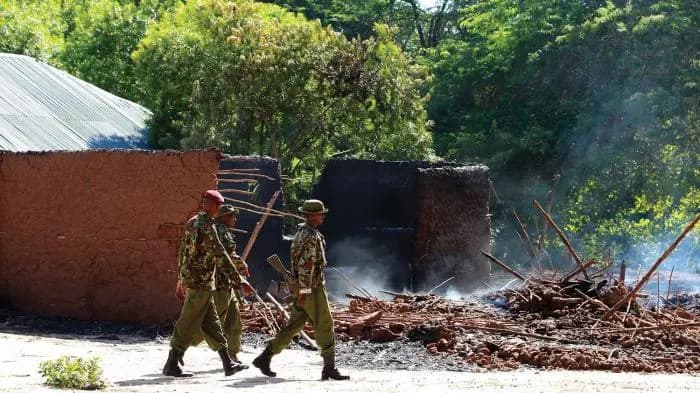We're loading the full news article for you. This includes the article content, images, author information, and related articles.
Upcoming polls in Western Kenya, a key political barometer for 2027, are dangerously escalating with reports of fatalities, widespread voter bribery, and accusations of state-sponsored intimidation, prompting intervention from Kenya's electoral commission.

A series of by-elections in Western Kenya, scheduled for Thursday, November 27, 2025, have descended into a volatile mix of deadly violence, cultural clashes, and rampant voter bribery, raising significant concerns about the integrity of the polls and the stability of the region. These elections are widely viewed as the first major political showdown between President William Ruto's broad-based government and a new United Opposition coalition, making them a crucial litmus test for the 2027 General Election.
The most severe violence has erupted in Homa Bay County's Kasipul constituency, where clashes between rival supporters on November 6, 2025, resulted in the deaths of two young men. The deceased, identified as Ben Ondiege and Bruno Onyango, both 26, died from severe head injuries sustained during a confrontation in the Opondo area of Central Kasipul Ward. The clashes, which also left nearly a dozen people injured and property destroyed, reportedly occurred after supporters of ODM candidate Boyd Were and independent candidate Philip Aroko held overlapping rallies.
In response to the fatalities, the Independent Electoral and Boundaries Commission (IEBC) took decisive action. On Wednesday, November 19, 2025, the IEBC's Electoral Code of Conduct Enforcement Committee fined both Mr. Were and Mr. Aroko KSh 1 million each. Announcing the verdict, Commissioner Alutalala Mukhwana stated the committee found both candidates responsible for the violence due to their failure to adhere to a harmonized campaign schedule. The IEBC issued a stern warning that any further violations could lead to disqualification. The commission also condemned the reported involvement of the Homa Bay County government in the campaigns, accusing it of misusing public resources in contravention of the Elections Offences Act.
Beyond the physical violence, the Kasipul contest has been characterized by intense cultural politics. Mr. Were, at 27 years old, has faced attacks from rivals over his youth and unmarried status, which are being framed as indicators of his unsuitability for leadership in a culturally conservative area. Homa Bay Deputy Governor Oyugi Magwanga publicly questioned Mr. Were's suitability, stating that leadership requires “someone who has a family he heads.” This line of political attack highlights the deep-seated socio-cultural dynamics at play in the region's politics.
Furthermore, campaigns across the region have been tainted by what multiple reports describe as “normalized” and open voter bribery. Residents have been observed queuing after rallies to receive handouts ranging from Sh50 to Sh200. The opposition has escalated these claims, with Wiper party leader Kalonzo Musyoka alleging a state-sponsored scheme to offer voters up to KSh 5,000 to photograph their marked ballots as proof of their vote. The government has dismissed these accusations as propaganda from a side sensing defeat.
The violence is not confined to Kasipul. In Malava, Kakamega County, and Chwele Ward, Bungoma County, campaigns have been similarly combustible, marked by intimidation and allegations of state interference. A convoy belonging to Trans Nzoia Governor George Natembeya was attacked in Chwele on November 22, 2025. Opposition figures have labeled these incidents as “state-sponsored violence,” a charge the government denies.
The National Police Service (NPS), through spokesperson Muchiri Nyaga in a statement on November 13, has assured the public of its commitment to providing robust security and maintaining neutrality during the 24 scheduled by-elections. Homa Bay County Commissioner Ronald Mwiwawi has also appealed for calm and confirmed that investigations into the Kasipul deaths are underway. Meanwhile, the National Cohesion and Integration Commission (NCIC) is reportedly investigating several high-profile leaders, including Homa Bay Governor Gladys Wanga, for inflammatory remarks and hate speech.
Election observers have sounded the alarm. Amnesty International Kenya has described these by-elections as the most significant stress test of the country's electoral system before 2027. The Elections Observation Group (ELOG) has formally petitioned the IEBC to take firm action against public officers engaging in partisan political activities, which is prohibited under Kenyan law. As the campaigns concluded on Monday, November 24, 2025, at 6:00 PM EAT, a tense calm has settled over the regions, but the underlying tensions and the high-stakes nature of these polls serve as a stark reminder of the fragility of Kenya's electoral peace.
Keep the conversation in one place—threads here stay linked to the story and in the forums.
Sign in to start a discussion
Start a conversation about this story and keep it linked here.
Other hot threads
E-sports and Gaming Community in Kenya
Active 9 months ago
The Role of Technology in Modern Agriculture (AgriTech)
Active 9 months ago
Popular Recreational Activities Across Counties
Active 9 months ago
Investing in Youth Sports Development Programs
Active 9 months ago
Key figures and persons of interest featured in this article